“One man soweth, another repeath” is an appropriate scriptural adage for the educational accomplishments of Msgr. Bernard J. Dolan (1890-1968), one of the most influential clerics ever to serve the Catholic Church in California.
Born in Ireland’s County Roscommon, young Bernard immigrated to Worcester, Massachusetts, where he enrolled at Holy Cross College. Excelling in the classics, he drew the attention of several prominent bishops, including John J. Cantwell of Los Angeles.
Ordained in the Basilica of the Assumption in Baltimore by James Cardinal Gibbons, Father Dolan came west in 1919. He occupied several pastoral appointments before being named secretary and later chancellor to Bishop Cantwell. He occupied that position for fourteen years becoming a monsignor in 1932.
Dolan went to Saint Anthony Parish in Long Beach as pastor in 1938. While there he continued to serve in many positions at the archdiocesan level, especially during the administration of James Francis Cardinal McIntyre. Dolan had a wide and justified reputation as a public speaker. He preached at the first episcopal ordination in Saint Vibiana Cathedral when Stephen J. Alencastre was entrusted with the vicariate Apostolic of the Hawaiian Islands.
In Long Beach, Msgr. Dolan took up the pastoral mantle with great gusto. He was especially anxious to expand the educational visions of his predecessor who viewed Saint Anthony’s as the focal point of the Church’s educational outreach in the area.
Prior to the 1920s, Long Beach was a popular seaside resort of about 50,000 people. For over two decades there had been a school attached to Saint Anthony parish and, in 1921, the first unit of a high school began in the second story of the parochial grammar school under the watchful eye of Father James A. Reardon. The separate schoolhouse for the high school, built in 1927, was described as “expressing the highest and most modern standards in convenience and equipment” it was totally destroyed in the 1933 earthquake.
Within a year, a new edifice had been completed and the school was once again functioning with 200 students in attendance. In 1941, Msgr. Dolan arranged for the Holy Cross Brothers to take charge of the boys unit relocated on property at Seventh Street and Olive Avenue. That building contained eight classrooms, a library, physics and chemistry laboratories and administration offices.
Saint Anthony High School opened in 1948 with an enrollment of 517, the largest number in its history. The Sodality and Glee Club were especially active in promoting specialized activities in the religious and athletic phases of school life. The Glee Club featured study of both secular and religious music, including modern and classical selections. Six new classrooms, a new library and an audio-visual unit were added to the Saint Anthony Girls School in 1949. A branch of the Christian Family Forum was established on campus.
By 1952, there were 620 students in Saint Anthony Boys High School. New facilities included a fifty-passenger school bus, new showers, locker and equipment rooms at the memorial stadium. Classes enhancing the curriculum included business law, economics, mechanical drawing and citizenship.
By 1955, the schools at Saint Anthony formed the largest Catholic educational plant West of Chicago. When the elementary school occupied new quarters that year, the older building was added to the secondary level. Altogether the parochial schools at Saint Anthony enrolled 2000 students.
Saint Anthony High School began the fall term in 1956 with 700 boys and 750 girls. A new biology department was made available for the first time. While students were on vacation in 1957, their dads invaded the campus for a facelift operation on Saint Anthony Memorial Stadium. The Home and Visitor stands were painted and forty-five modern lockers were installed. A cement walkway was laid in front of the Visitors bleachers.
Throughout its history, Saint Anthony High School achieved a unique number of vocations to the priesthood and religious life. Between 1937 and 1962, the school sent 209 boys and girls to seminaries and novitiates. The 31 Club, which had no meetings or dues, was comprised of boys who promised to attend Mass, receive Holy Communion and pray the Rosary one day each month.
In 1969, Saint Anthony High School began its fiftieth year by reverting to its original co-educational status. The two schools were merged into a single unit, thus moving from co-institutional to co-educational.
Known and remembered for his many pastoral and administrative talents, Msgr. “Bernie Dolan” stands out in historical annals as a “champion” of Catholic Education.

